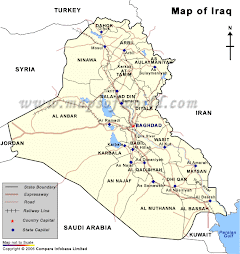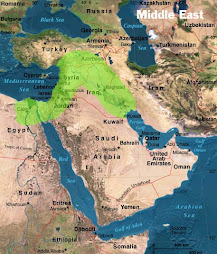Less talk about "Islamic radicalism" and a lot more about doing business. In the year since President Barack Obama pledged a new beginning in the relationship with the world's Muslims, the White House has begun to change the US focus.
Terrorism still dominates US security priorities, but the White House believes it does not have to dominate the conversation. Since Obama's speech in Cairo, Egypt, last year, the White House has tried to talk more about health care, science and education.
It is a strategy based on the belief that the prior administration viewed the world through the lens of terror. When it talked to Muslim nations, it was all about winning the war of ideas.
"You take a country where the overwhelming majority are not going to become terrorists, and you go in and say, 'We're building you a hospital so you don't become terrorists.' That doesn't make much sense," National Security Council staffer Pradeep Ramamurthy said.
Ramamurthy runs the administration's Global Engagement Directorate, a four-person National Security Council team that Obama launched last May with little fanfare and a vague mission to use diplomacy and outreach "in pursuit of a host of national security objectives." Since then, the division has not only helped change the vocabulary of fighting terrorism but has shaped the way the country invests in Muslim businesses, studies global warming, supports scientific research and combats polio.
Obama advisers also are rewriting the document that spells out the country's national security strategy and plan to leave out references to "Islamic radicalism," counterterror officials said, speaking on condition of anonymity because the document still is being written and is weeks away from release. Currently, the document declares: "The struggle against militant Islamic radicalism is the great ideological conflict of the early years of the 21st century."
Now, before diplomats go abroad, they hear from the Ramamurthy or his deputy, Jenny Urizar. When officials from the National Oceanic and Atmospheric Administration returned from Indonesia, the NSC got a rundown about research opportunities on global warming. Ramamurthy maintains a database of interviews conducted by 50 US embassies worldwide. Business leaders from more than 40 countries head to Washington this month for an "entrepreneurship summit" for Muslim businesses.
"Do you want to think about the US as the nation that fights terrorism or the nation you want to do business with?" Ramamurthy said.
Many international Muslim leaders have cheered the new tone, not just for its symbolism but because it makes it politically easier for them to cooperate with the United States.
"It's also a clear indication of President Obama's substantial understanding of the intricacies of Muslim politics," Jordanian lawmaker Hamada Faraaneh said.
On Wednesday, Iraqi government spokesman Ali al-Dabbagh praised indications that the Obama administration would keep religious rhetoric out of the US security strategy.
"It is a good message of assurance, and differs from the former American administration's position on this matter which showed no real understanding of Islamic countries," al-Dabbagh said. "This decision by Obama will help to reform the image Muslims have of America."
Public opinion polls have shown consistent improvement in sentiment toward the United States among Muslims, although the viewpoints remain overwhelmingly negative.
To deliver his message, Obama's speechwriters have at times taken inspiration from former President Ronald Reagan. Speaking in communist China in 1984, Reagan spoke about education, space exploration and scientific research. He discussed freedom and liberty. He never mentioned communism or democracy.
"They didn't look up to the US because we hated communism," said Deputy National Security Adviser Ben Rhodes, Obama's foreign policy speechwriter.
Like Reagan in China, Obama in Cairo made only passing references to terrorism. Instead he focused on cooperation. He announced the United States would team up to fight polio with the Organization of the Islamic Conference, a multinational body based in Saudi Arabia. The United States and OIC had worked together before, but never with that focus.
"President Obama saw it as an opportunity to say, 'We work on things far beyond the war on terrorism,'" World Health Organization spokeswoman Sona Bari said.
Polio is endemic in three Muslim countries — Nigeria, Pakistan and Afghanistan — but some Muslim leaders have been suspicious of vaccination efforts, which they believed to be part of a CIA sterilization campaign. Last year, the OIC and religious scholars at the International Islamic Fiqh Academy issued a fatwa, or religious decree, that parents should have their children vaccinated.
The Centers for Disease Control and Prevention also began working more closely with local Islamic leaders in northern Nigeria, a network that had been overlooked for years, said John Fitzsimmons, deputy director of the CDC's immunization division.
Although health officials are reluctant to assign credit to any one action, new polio cases in Nigeria fell from 83 during the first quarter of last year to just one so far this year, Fitzsimmons said.
Obama did not invent Muslim outreach. President George W. Bush gave the White House its first Quran, hosted its first Iftar dinner to celebrate Ramadan and loudly stated support for Muslim democracies like Turkey.
But the Bush administration struggled with its rhetoric. Muslims criticized Bush for describing the war on terrorism as a "crusade" and labeling the invasion of Afghanistan "Operation Infinite Justice" — words that were seen as religious. He regularly identified America's enemy as "Islamic extremists" and "radical jihadists."
Karen Hughes, a Bush confidante who served as his top diplomat to the Muslim world in his second term, urged the White House to stop.
"I did recommend that, in my judgment, it's unfortunate because of the way it's heard. We ought to avoid the language of religion," Hughes said. "Whenever they hear 'Islamic extremism, Islamic jihad, Islamic fundamentalism,' they perceive it as a sort of an attack on their faith. That's the world view Osama bin Laden wants them to have."
Hughes and Juan Zarate, Bush's former deputy national security adviser, said Obama's efforts build on groundwork from Bush's second term, when some of the rhetoric softened. But by then, Zarate said, it was overshadowed by the Guantanamo Bay detention center, the abuses at Abu Ghraib prison and a prolonged Iraq war.
"In some ways, it did not matter what the president did or said. People weren't going to be listening to him in the way we wanted them to," Zarate said. "The difference is, President Obama had a fresh start."
Obama's foreign policy posture is not without risk. Even as he steps up airstrikes abroad, he has proven vulnerable to criticism at home, such as the failed Christmas Day airline bombing and the announced-then-withdrawn plan to prosecute self-described 9/11 mastermind Khalid Sheikh Mohammed in New York.
Peter Feaver, a Duke University political scientist and former Bush adviser, is skeptical of Obama's engagement effort. It "doesn't appear to have created much in the way of strategic benefit," he said. Obama risks seeming to adopt politically correct rhetoric abroad while appearing tone-deaf on security issues at home, Feaver said.
The White House dismisses such criticism. In June, Obama will travel to Indonesia, the world's most populous Muslim country, and is expected to revisit many of the themes of his Cairo speech.
"This is the long-range direction we need to go in," Ramamurthy said. –Jamal Halaby in Amman, Jordan, and David Rising in Baghdad contributed to this report.
http://www.thedailynewsegypt.com/article.aspx?ArticleID=29024




